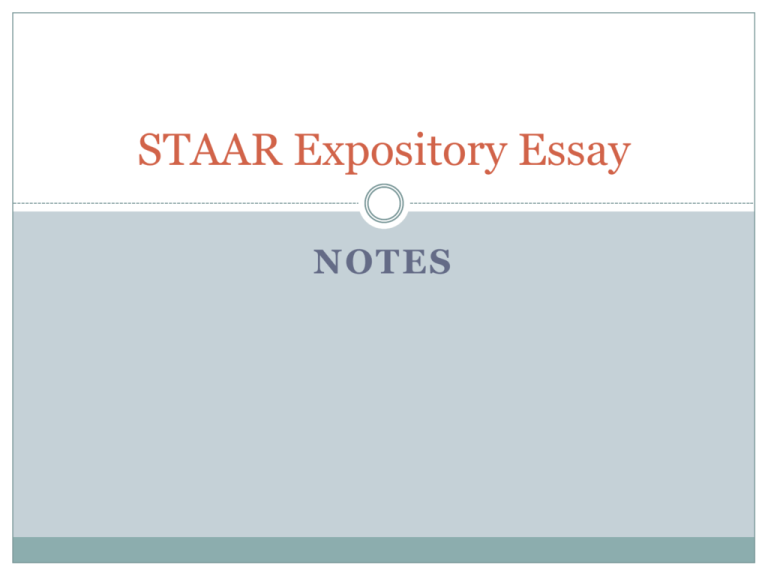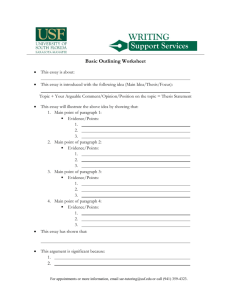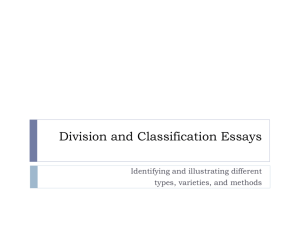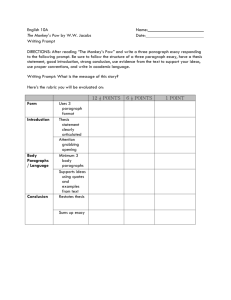STAAR Expository Essay
advertisement

STAAR Expository Essay NOTES STAAR Expository Essay ANALYZING THE PROMPT AND WRITING THE EXPOSITORY ESSAY Expository Writing •E X P L A I N S Y O U R T H I N K I N G I N A C L E A R A N D COMPLETE WAY. •E X P O S I T O R Y = E X P L A I N ; E X P O S I T O R Y COMES FROM EXPOSE. TO EXPOSE SOMETHING MEANS TO SHOW IT. •E X P O S I T O R Y W R I T I N G M E A N S T O S H O W YOUR THINKING. Analyzing the Prompt Analyzing the Prompt • The STAAR essay prompt has three parts to it: • READ: This is an idea to activate your brain • THINK: This is the brainstorming part • WRITE: This is the topic on which you will write your essay; be sure to break this down to UNDERSTAND exactly what you will develop in the essay. Format of the Essay The Essay [ideally] should have a minimum of four paragraphs Introduction Two Body Personal Connection / or 1st General [universal] Connection 2nd General [universal] Connection Conclusion The Introduction Introductory Paragraph: Hook, Stretch, Thesis Hook Brings your reader into the essay. Link you opening idea(s) to the “Read” or “Think” portions of the prompt Stretch / Connect to the Thesis Expand the idea from your hook to include the idea(s) within the thesis Thesis This states the purpose of the paper—either explicitly or implicitly—by stating the reason(s) directly or indirectly. The Body Paragraph Body Paragraph: Topic Sentence Topic Sentence General statement that tells the reader what he/she will learn from the paragraph The topic sentence supports the thesis statement Pull words from the thesis to develop the TS One sentence Body Paragraph: CD/CM Supporting Details This is the evidence/ support to back up your topic sentence You need to prove your point to the reader Five to Six sentences CD-CM-CM CD-CM-CM CD=Concrete Detail [A paragraph] Topic Sentence. CD / “CD.” CM. CM. Transitional words, phrases, sentence as needed Example CM=Commentary Explanation/Analysis Transitional Sentence/Concluding Sentence It is important to end your first body paragraph with a transitional sentence The transitional sentence leads the reader to the next topic. In the second body paragraph, end with a concluding sentence The concluding sentence wraps up the 2nd body paragraph Transitional Words It is important to use transitional words in your writing These words help guide the reader through your essay. Transition words / phrases include [but are NOT limited to] For example, for instance, first, next, last, [etc.] And Some More. . . To Add [attach to something else]: To Compare [to show comparison / contrast]: and, again, and then, besides, equally important, finally, further, furthermore, nor, too, next, lastly, what's more, moreover, in addition, first (second, etc.) whereas, but, yet, on the other hand, however, nevertheless, on the contrary, by comparison, where, compared to, up against, balanced against, vis a vis, but, although, conversely, meanwhile, after all, in contrast, although this may be true To Prove [to help illustrate a point]: because, for, since, for the same reason, obviously, evidently, furthermore, moreover, besides, indeed, in fact, in addition, in any case, that is And so on. . . Building a Body Paragraph Think of building your body paragraphs like putting together a double-decker hamburger You need the basics—bun and burger The bun is your Intro and Conclusion—just the right size to contain the content and substantial enough to not fall apart. The burger patties are your reasons—fully formed and cooked to safety standards The extras--cheese, lettuce, tomato, onion—include style, organization, and editing The Conclusion Conclusion A concluding paragraph wraps up what you said in your essay It should be no more than three sentences Start with a transitional word/phrase Ultimately / Finally / Overall / etc. Leads the reading to a natural close / completion Succinctly Refer to One of the Three Rs Reduce the content of the essay to a statement that concludes [what can be drawn from the essay OR what lesson can be learned] creates a “truth” that is not cliché. Rephrase / Refresh your evidence [Do not merely restate] Remind the reader why your points were important / why the explanation is valid For Example: READ the information in the box below. In 1955 medical researcher Jonas Salk introduced an effective polio vaccine. At the time polio was considered the biggest threat to public health, yet Salk refused to profit by patenting the vaccine because he was more concerned with preventing disease than with personal gain. Think carefully about this statement: Although many people work to benefit themselves, some people choose to put others first. Write an essay explaining whether people should be more concerned about others than about themselves. Be sure to— clearly state your thesis organize and develop your ideas effectively choose your words carefully edit your writing for grammar, mechanics, and sentences Check The Rubric What differentiates between a Score of a 2 and a 3? What differentiates between a Score of a 3 and a 4? Check it out: Sample Essay 1 [slides 22-27; source: TEA website & Victoria Young] Thinking about others before you is a nice thing to think of, but if you think of yourself first it makes you feel isolated. Caring about others before you isn’t a bad thing, but thinking about yourself isn’t bad either. To me I think of others before me. Some people have the good life, others don’t. I’ll rather put myself in danger than others being in danger as well. I’m only one person but risking myself could save more than one life. When your in a room where there seems to be a fire some people will think of themselves while others think of the rest. The doctor could risk himself of getting polio but he could save hundreds of lifes that currently have polio. To me people that think of themselves before others are selfish and maybe greedy, but others that think of others are kind people. [handwritten version is 25 lines long] What Score do you think this essay earned? Why? Sample Essay 2 Humanity has a funny way of contradicting itself sometimes. All children are taught to share and put others’ needs before our own. Somewhere down the line we realize that the very people who preach these things to us don’t follow their own rules. It is very important in society today to remember the bigger picture, which often includes doing things to help others with no benefit to yourself. People use each other for personal gain all the time. A glorified outlook on this way of life is all around us. In media people are more concerned with which Hollywood star is going out with which millionaire rather than the thousands of people dying of hunger in third world countries. As consumers we see this life and wish to be like that. Doing something for monitary gain is just like money itself: easily expendable and transient. But doing something to help others leads to emotional or moral gain. The memmories and feelings you get from helping others won’t ever go away. It’s worth something to you. Worth more than money ever could be. [Handwritten version is 22 lines in length.] In a Nutshell—Lower Scoring Range Typical problems we’ve seen in papers falling in the lower score range (1s and 2s) Wrong organizational structure/form for purpose Weak, evolving, or nonexistent thesis Wasted space: repetition, wordiness, extraneous details or examples, looping/meandering, meaningless introductions and conclusions Inclusion of too many different ideas for 1 page General/vague/imprecise use of language or inappropriate tone for purpose Essay poorly crafted Weak conventions In a Nutshell—Higher Scoring Range Typical strengths we’ve seen in papers falling in the higher score range (3s and 4s) Strong match between structure/form and purpose Explicit thesis and sustained focus “Narrow and deep” development—no wasted words or space Think quality over quantity! Introduction and conclusion short but effective Specific use of language and appropriate tone for purpose Essay well crafted Strong conventions





